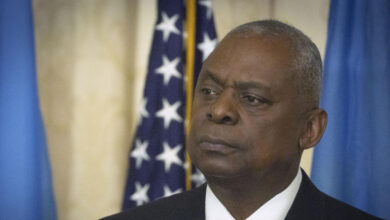Did ‘Time’ magazine choose Adolf Hitler as its Person of the Year in 1938?

President-elect Donald Trump may be named Time magazine’s Person of the Year for the second time, joining the ranks of well-esteemed and controversial individuals who have been granted the honorary title, including Adolf Hitler.
Trump, named Person of the Year in 2016, is expected to be crowned on the cover of Time on Thursday, Politico reported. Last year, the Person of the Year was pop star Taylor Swift. Ukrainian President Volodymyr Zelensky was named the recipient in 2022.
Person of the Year started in 1927 when the Time editors tried to amend the “slow news days” they were facing leading up to New Year’s. The magazine’s first Person of the Year was aviator Charles Lindbergh following his historic solo flight across the Atlantic.
While the magazine denies it, the Person of the Year title is often considered an award or honor. There have been 41 unique global leaders who have been chosen as Person of the Year.
Time chooses people for the most significant impact on the world over the past 12 months, meaning both good and bad, according to the magazine. Controversial figures like Adolf Hitler, Joseph Stalin, Vladimir Putin and Nikita Khrushchev have received the title for their impact on global events.
“Arguably you could do a bad guy every year and be justified,” Time wrote in 2014.
Adolf Hitler: Man of the Year in 1938
AP Photo
A decade after Time started issuing the honorary title, Nazi leader Adolf Hitler was named Person of the Year.
In the issue published on January 2, 1939, Hitler was recognized as “the greatest threatening force that the democratic, freedom-loving world faces today.”
“Most other world figures of 1938 faded in importance as the year drew to a close,” the article read. “But the figure of Adolf Hitler strode over a cringing Europe with all the swagger of a conqueror.”
The magazine recognized that Hitler “brought 10,500,000 more people (7,000,000 Austrians, 3,500,000 Sudetens) under his absolute rule.”
“His shadow fell far beyond Germany’s frontiers,” the article said.
Time also discussed Hitler’s upbringing, calling him a “spoiled child by a doting mother” who failed “to pass even the most elementary studies.”
Hitler’s political career started in 1919 when he became Member No. 7 of the German Labor Party. He quickly rose to the ranks as the party’s leader and changed it to the National Socialist German Labor Party. Hitler wrote an “antisemitic, antidemocratic, authoritarian program.”
“Outlawed in many German districts, the National Socialist Party nevertheless climbed steadily in membership,” the article said. “The situation which gave rise to this demagogic, ignorant, desperate movement was inherent in the German Republic’s birth and in the craving of large sections of the politically immature German people for strong, masterful leadership.”
In 1938, Hitler assumed the title of Commander in Chief, taking charge of the armed forces and removing generals he did not like. Throughout 1938, Hitler also introduced foreign policy with the ultimate goal of war. An election was held that year, but voters were presented with a single list of Nazi and pro-Nazi options.
“Civil rights and liberties have disappeared,” Time wrote. “Opposition to the Nazi regime has become tantamount to suicide or worse. Free speech and free assembly are anachronisms.”
Following his Person of the Year recognition, Hitler went on to invade Poland, marking the start of World War II. He and his military operations were central to the Holocaust, which resulted in the genocide of about six million Jewish people and millions of other minority victims.
Hitler died on April 30, 1945, of suicide after it became increasingly clear that Germany was going to lose the Battle of Berlin, which eventually led to the end of World War II.




